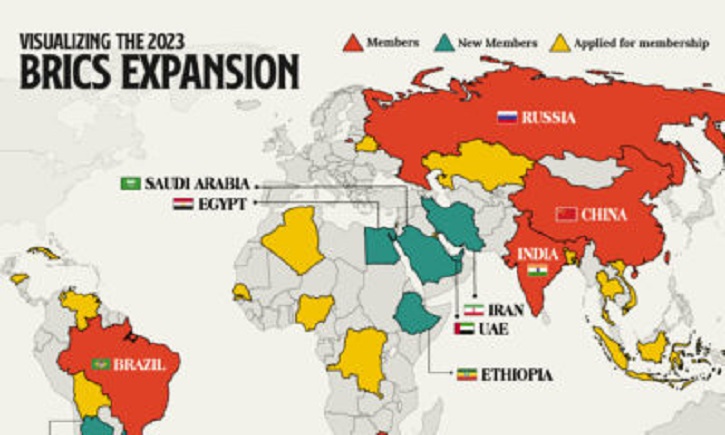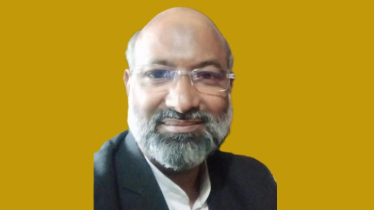
Photo: collected
The coveted and oft-discussed BRICS Summit just concluded with the main announcement of BRICS expansion with six new members – Saudi Arabia, Iran, Argentina, Egypt, Ethiopia and the United Arab Emirates. They will become full BRICS members in January 2024.
BRICS expansion was being touted for mainly three reasons - the intense East-West confrontation; the deepening of “BRICS Plus” cooperation; and, the demands from “node” countries that have geostrategic significance and burgeoning economic prowess. The conflict between Russia and Ukraine, the intensifying Sino-U.S. competition, and the confrontation between the East and the West, and the disparity of power between the Global North and South has become increasingly prominent. Both sides are vying to expand their respective network to consolidate their camps and influence. This gives the BRICS countries a strong motivation to absorb other “node” countries in BRICS, which has been touted as a counterbalance of the G7’s global influence, and offer an alternative to the US Dollar hegemony.
It must be conceded that the outcome of the anticipated, coveted, and much-discussed BRICS Summit is inadequate and insufficient to the hype the summit had rendered to its run-up.
Reportedly, about 40 countries had applied for BRICS membership; the forum was touting the introduction of a new common gold-based currency to counter the global US Dollar hegemony. The group would have supposedly expanded to instigate restructuring of the existing international order and reform the UN Security Council. BRICS was supposed to become a counterweight to west west-dominated global order.
Frankly speaking, none of it happened, except for the expansion, which also remained lamenting compared to the preceding interest and discourse regarding BRICS’ expansion. The six countries that have been inducted in the expanded BRICS+ underscores an interesting dynamic. Let’s consider Egypt and Ethiopia for instance. BRICS members challenging the US global dominance, mainly China and Russia, are focused on enhancing their influence in Africa.
The entire African region, except Nigeria to some extent and Kenya, is moving away from the West and wants stronger ties with the East. Ethiopia is one of the four and the most prominent countries in the Horn of Africa, which is strategically and economically an important area. The region has broader access to the sea. It is bounded by the Red Sea, the Gulf of Aden, and the Indian Ocean. This makes the region a key place, interconnecting the three continents: Africa, Europe, and Asia. Its geostrategic importance has made the region a major scene for superpower contention in the preceding decades. Thus, the inclusion of Ethiopia as one of the fastest-growing economies and hosting the headquarters of the African Union makes a lot of sense. Moreover, Ethiopia has significant reserves of metallic minerals (gold, platinum, iron, nickel, chromite and base metals), fertilizer raw minerals (potash and phosphate), gemstones (sapphires, emeralds, fiery opals), energy minerals (lithium, graphite and tantalum, oil shale and coal), cement raw minerals (limestone, gypsum, clay, pumice), ceramics raw minerals (kaolin, feldspar), glass raw minerals (silica sand), dimension stones (marble, granite, limestone, sandstone, diatomite, bentonite, soda ash, salt, graphite and sulphur), and natural gases and hydrocarbons. So, Ethiopia becomes a nodal country for BRICS in the African region, and thus, the inclusion in BRICS.
Egypt has an important geostrategic position as it is located in the three circles of Arab world, African continent and Islamic world simultaneously. Egypt is the key region of the Belt and Road Initiative (BRI), with leading and radiating effects on Africa and West Asia. It also provides significantly unique access to the Suez Canal, an important artery of global trade symbiosis. The oil reserves in Egypt are considered to be the sixth largest on the African continent. Egypt has vast quantities of natural gas that are some of its most important natural resources. According to the Egyptian government, the country has more than 65,201 billion cubic feet of natural gas. Due to the vast quantities of natural gas in the country, the Egyptian government has put in place a strategy to ensure that the country becomes one of the leading producers of natural gas in the region. Egypt is also home to a wealth of mineral resources including gold, copper, silver, zinc, platinum and a number of other precious and base metals.
Argentina is a regional power and retains its historic status as a middle power in international affairs. Like Brazil, Argentina is strategically important to Europe, both as trade partners and as weighty representatives of the Global South. Despite domestic challenges, Argentina, like Brazil, is trying to exert its influence on global challenges such as climate change, food, and energy security. Argentina has vast natural resources in energy and agriculture. Within its 2.8 million square kilometers of territory, it is endowed with extraordinarily fertile lands, gas, and lithium reserves, and has great potential for renewable energy. As Brazil aspires to take a leading global role in renewable energy, Argentina’s lithium reserves could cover 20% of global demand in 2030. Notably, lithium is a key mineral for renewable energy and other industrial uses. Argentina is a leading food producer with large-scale agricultural and livestock industries. In addition, it has significant opportunities in some manufacturing subsectors, and innovative services in high-tech industries. Moreover, Argentina and Brazil share a symbiotic political relationship that would complement their co-existence in a BRICS-like forum.
Saudi Arabia and energy resources are undoubtedly the key reason for the Islamic country’s inclusion. Saudi Arabia complements Israel as a resource-rich coherent nation-state on the southern rim of the region, in a strategic alliance with the United States. Its ability to project power into the zone of conflict extending from Iraq to the Mediterranean is noteworthy. Its natural resources and religious reach provide it with considerable assets and soft power, which, along with its strategic location, make it a critical state in the global system. China is seeking to expand its ties with Saudi partners at the strategic level. Also, every other economically aspirant country wants to ensure energy sourcing from Saudi Arabia to ensure its respective energy security in the long run. Moreover, Saudi Arabia’s inclusion is a key factor in countering the global influence of the Petrodollar, and thus, Saudi was a natural choice for BRICS.
Considering UAE’s geostrategic importance, it is the most natural candidate for BRICS+ expansion. UAE is a unique global candidate for international relations nuances. The UAE’s economic relations with China do not devalue its relationship with the United States. Nor does diplomatic engagement with Russia over Syria constitute a departure from its strategic relations with the U.S., in the same way, that evolving ties with Saudi Arabia do not suggest a withdrawal from the Gulf Cooperation Council (GCC). Successfully and uniquely capitalizing a networked world order is the replacement of the concept of grand competition with a strategy for “grand complementarity,” the UAE’s rapprochement with Turkey is an example of a successful transition from political competition to economic complementarity. The same can be said of the UAE’s approach to Iran. This explains how the UAE can develop relations with opposing countries like Iran and Israel at the same time — or India and Pakistan and Ethiopia and Eritrea. For the UAE, and the GCC countries, the Arabian Peninsula, with the four seas surrounding it, encourages an engagement strategy centered on regional connectivity. Each body of water is a gateway to a strategic area. The UAE already has direct geographic access to the Arabian Gulf and the Arabian Sea. But it has also developed strategic access to the Red Sea through its port operators and the Mediterranean through the East Med Gas Forum. Dubai Ports World’s (DPW) investments in facilities in West Africa, after developing ports in the Red Sea and river terminals in Central Africa, illustrate how the UAE sees Africa as a gateway to South America. This complements its diplomatic drive in South America, where it has opened missions in Argentina, Brazil, Colombia, Venezuela, Chile, Uruguay, and Peru, and plans to open one in Paraguay. The UAE’s economic and diplomatic activities are based on developing connectivity corridors that allow trade between economies to flow seamlessly through the region.
Iran is crucial for another global artery – the Strait of Hormuz. Iran is strategically important because it is the route connecting the Indian subcontinent to the Mediterranean Sea. Iran’s oil fields are critical to global energy security. Equally important as its size, is Iran’s key location at the junction of the Asian continent and the low, mostly desert areas of the Arab Middle East. Stretching from the Caspian Sea to the Persian Gulf to the Indian Ocean, and from the rivers of Mesopotamia to the fringes of the Hindu Kush, Iran is in one sense truly a colossus.
With the inclusion of Saudi Arabia, Iran, UAE and Egypt, one could argue that BRICS expansion is very Middle East-centric. To be more precise, the expansion included countries that are nodal to each significant region as well as provide key energy, minerals, political, and global connectivity advantages, all of which are key for the developing economies of the original BRICS nations, as well as the new members. Thus, the choices for expansion are based on complementary interests.
BRICS did not fully deliver on the de-dollarization front, doing almost nothing to counter the US dollar hegemony globally. The only development that has been gleaned is that the BRICS nations have decided to trade in their local currencies, which circumvents the US Dollar dependence, a respite for Russia mostly. However, the trading of the local currencies is likely to be pegged on the US Dollar exchange rate, so BRICS is yet to significantly deliver on the countering of the US Dollar hegemony front.
Overall, the BRICS Summit remained wanting compared to the hype it had created in the run-up to it. Questions like why other countries, especially Bangladesh are not considered for inclusion are rife. The answer to these questions depends mostly on who is responding to the question. However, the idea that countries that may face sanctions in the future are not considered for inclusion seems flimsy at best, considering Iran’s inclusion and Russia being a founder member. It seems the BRICS forum that operates on a consensus modality mostly focuses on countries for expansion that provide key strategic benefits to the forum and each founding member. Bangladesh has yet to fit that bill.
It is clear from the BRICS discourse and speeches, statements, and analysis during the run-up and in the Summit that China and Russia were keen on expanding the group, as was South Africa, the host country that also wants to gain global political clout given its own ongoing domestic challenges. But, India and Brazil mostly became the bottlenecks. More notably, India again failed to live up to its boastful self-identity as the regional leader and big brother of South Asia. India as well as Brazil’s focus on “I only, and me first, then the rest” approach to global relations has held back the Global South and its aspirations for equal and equitable intervention in the global order.
The two countries are presently ruled by regimes, or individuals to be more precise, who pivot on populism and are hard-pressed to deliver on economic promises to maintain their leadership gravitas and stature. India has made significant gains on this front with recent trade deals with the US. Earlier this year, meetings between Brazil’s Lula and US President Biden also indicated similar gains for Brazil in the months to come. Thus, Brazil and India, or Lula and Modi specifically, opted to focus on individual gains and interests rather than the larger and cumulative interests of the BRICS and the Global South, which looked eagerly towards BRICS to create a more balanced world order, countering the west, mainly the US hegemony. BRICS failed to deliver on that expectation this time. Individual interests and petty political aspirations trumped cumulative interests and expectations.
The writer is Political and International Affairs Analyst.
The views expressed in this write-up are those of the authors and do not necessarily reflect the stances of The Business Eye.

.png)







